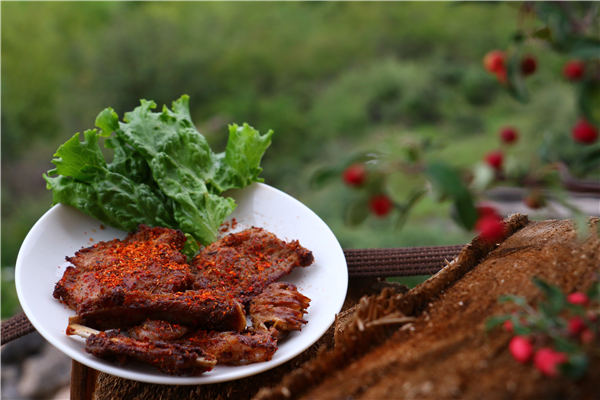The smoky black Tibetan pork rib, a signature dish at Hylandia by Shangri-La. Famed 'fragrant' pork, a Tibetan-style delicacy, delivers an authentic taste of Shangri-La, Xu Junqian discovers at a high-altitude tasting. The rarefied air on the Shangri-La plateau - with an altitude of 3,270 meters in southern China's Yunnan province - isn't really the reason that chef Wu Tinggang speaks slowly with deliberate pauses. Neither isn't the silky smooth cabernet sauvignon produced from the highest vineyard in the world, Shangri-La Vineyard, though Wu sips more than half a dozen of glasses throughout the evening. During his almost-20-year culinary career, the 37-year-old has cooked scores of steaks per day as part of training back at school, and catered for a luxury cruise with 5,000 passengers and 2,000 crew members for eight months. Now, however, in his new role as executive chef at Hylandia by Shangri-La, Wu simply finds it "an obligation" to slow down, enjoy work and life, and be idle, if not downright lazy. "I was told on my first day here that if one doesn't have altitude sickness during the first month, it's Shangri-La wanting him to stay and enjoy the life here. Here I am, three months later with some altitude weight gain even," he jokes. The native of Chengdu, Sichuan province, had never in his life been to a plateau before coming to Shangri-La in June. Three months later, the big achievement from Wu's kitchen, with some 20 cooks and another 20 helpers, is the smoky black Tibetan pork rib that, at a first glance, is no match for its classic Chinese peers, such as the golden-crusted and deep-fried pork chop from Shanghai, or the translucent half-fat-half-lean red-braised pork cube from Hunan province. Launched in August, Hylandia by Shangri-La is deemed an important milestone for the Hong-Kong hospitality group, as Shangri-La, the city, is popularly believed to be the physical inspiration of the earthly paradise depicted by James Hilton in Lost Horizon, from which the hotel group takes its name. While it has taken the group seven years of effort to build a hotel for modern-day explorers to "discover their own slices of paradise", chef Wu says his own job-to offer a bite of heavenly cuisine-has just begun. He begins from pigs, or more precisely, Tibetan fragrant pigs. A Tibetan fragrant pig, as the locals define it, has fed on wild nuts and snow-melt water. Trim from trotting around every day at an altitude up to 4,000 meters, it should be no heavier than 75 kilograms. It is believed to be an accidental hybrid from male wild boars in the primeval forests and female domestic pigs tended long ago by hunger-stricken Tibetans, who attempted to catch wild boars to fancy up their meals by having their female farm animals seduce them. The pig doesn't really give off a more pleasant smell than its flatland folks-not when alive. "Many people shun pork because of the greasy and guilty fatness, but the Tibetan pig has the perfect proportion of fat and lean meat for roasting," says Wu. He discovered the meat during a lunch with a Tibetan family while doing his field research about local cuisine. Hidden in northwest Yunnan's Diqing Tibetan autonomous prefecture, Shangri-La enjoys a unique geographical location that borders Sichuan, Tibet and Yunnan. As a result, the local cuisine is known for its combination of flavors from the three areas. For example, Wu's Tibetan pigs are marinated in 18 different Sichuan spices and herbs for five hours, and then roasted on charcoal made of three types of wood from Yunnan, the most forested province in China.
Pigs of paradise at Shangri-La restaurant
Editor:李莎宁
Source:中国日报网
Updated:2015-10-14 09:40:21
Source:中国日报网
Updated:2015-10-14 09:40:21
Special
Contact
Welcome to English Channel! Any suggestion, welcome.Tel:0731-82965627
lisl@rednet.cn
zhouqian@rednet.cn











